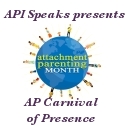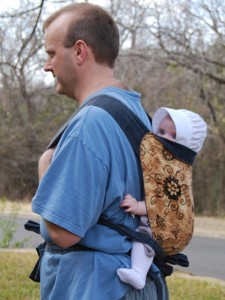We had many wonderful participants in the first-ever Carnival of Presence here on API Speaks. And that doesn’t include the guest posters and regular contributors who have shared their stories about giving their children presence all month long!
First, I’d like to take a moment to announce the wonderful Attachment Parenting Month prizes we have available here on API Speaks. Those who participated in the carnival, linked to the carnival on their blog, and those who go out and read one of the entries below and comment on this post with their thoughts on the carnival entry they read will all get a chance to win one of the following prizes:
- Grand Prize: A one-year membership to Attachment Parenting International.
- First Prize: A set of Bless You Mom affirmation cards and a copy of Judy Arnall’s book, Discipline Without Distress.
- Honorable Mention: A copy of The Successful Child from the Sears Parenting Library.
Second, I’d like to announce the topic for next month Attachment Parenting Carnival: Nighttime Parenting. How do you respond with sensitivity to your child’s nighttime needs?
And finally, I’d like to tell you about another fun AP Month activity: <strong>The AP Month Photo & Essay Contests!</strong> All parents love to talk about their children and who doesn’t like to show off their adorable pictures? Now’s your chance: There’s no fee to participate, and you don’t have to be a member to enter. Not only could you see your photo or essay published on our website or in one of our publications, but there are a number of other prizes available, too. For more information, including where to email your photo or essay, check out the essay contest guidelines and the photo contest rules.
And now for the entries!
- Alicia Bayer talks about cherishing each step in a her children’s growth in Being Present posted at Magic and Mayhem.
- Stephanie Precourt shares the story of deciding to conceive her third child in Adventures in Babywearing: Here posted at Adventures in Babywearing.
- Shelly talks about being present, even when your child is angry, in A Guiding Presence posted at Adventures of a Breastfeeding Mother.
- Elisa Forshey talks about which aspects of AP work for their family in Attachment Parenting Month posted at Herb of Grace.
- Shen-Li talks about what brought her to Attachment Parenting in Choosing a Parenting Style | Babylicious posted at Babylicious.
- Harmony Rose West talks about baby’s favorite place: A Mother’s Lap posted at Bless You Mom.
- Heather posts her thoughts on presence and a poem in My Gift posted at It’s Twinsanity.
- Tiffany shares the promises she’s making her children with regards to giving her presence in Giving Our Children the Gift of Presence posted at Green and Natural Parenting.
- J o e y & A l e e t h e a shares a post on how presence with your children can be relaxing too in what really matters? posted at J o e y & A l e e t h e a.
- Christina Geyer talks about how the generous parental leave in Germany is allowing her to give her child presence in How “socialism” helps me give my child presence posted at Mamas Worldwide.
- Candace shares how difficult it is to slow down and just be with your children in A Present of Presence posted at Mama Saga.
- Denise describes a day in the life of a mama with six children in Goodbye Lazy Summer Days posted at There’s always room for one more.
- Mon relates the importance of giving our children presence even during challenging (sleepless!) times in presence posted at Holistic Mama.
- Alisha describes their ritual Friday Night Pizza night in Friday Night = Family Night | Uber Parents posted at Uber Parents.
- east end jenn tells how one working family finds time for presence in Sign Us Up: Sometimes a Full Schedule Can Mean More Time For Each Other posted at Postcards From The East End.


 This is a question that I have struggled with a lot in the four-and-a-half years, since I had my first son, Ryan, and discovered there was a parenting approach that lined up with my parenting views. I questioned that if I didn’t practice all elements of Attachment Parenting (AP), could I really call myself an “attached parent?”
This is a question that I have struggled with a lot in the four-and-a-half years, since I had my first son, Ryan, and discovered there was a parenting approach that lined up with my parenting views. I questioned that if I didn’t practice all elements of Attachment Parenting (AP), could I really call myself an “attached parent?”
